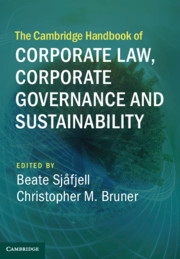Book contents
- Reviews
- The Cambridge Handbook of Corporate Law, Corporate Governance and Sustainability
- The Cambridge Handbook of Corporate Law, Corporate Governance and Sustainability
- Copyright page
- Dedication
- Contents
- Contributors
- Forewords
- Preface
- Introduction
- Part I Global Business and Fragmented Regulation
- Part II Corporate Law, Financial Markets and Sustainability
- Part III Corporate Law, Corporate Governance and Sustainability: Case Studies
- 10 Progress Is Possible
- 11 Green but Not Enough
- 12 The Australian Paradox
- 13 Moving beyond Virtue Signalling
- 14 The EU as a Potential Norm Creator for Sustainable Corporate Groups
- 15 Market-Led Sustainability through Information Disclosure
- 16 Law, Culture and Sustainability
- 17 Stakeholder Value versus Corporate Sustainability
- 18 Worker Participation, Sustainability and the Puzzle of the Volkswagen Emissions Scandal
- 19 Corporate Sustainability and Shareholder Activism in the Netherlands
- 20 Old-Fashioned yet Innovative
- 21 The Unsuccessful Pursuit for Sustainability in Italian Business Law
- 22 Sustainability and the Transformation of the Socialist Corporation into the Private Corporation
- 23 Limited Demand, Limited Supply
- 24 The Pacific Alliance
- 25 Social Environmentalism and Corporate Capture
- 26 The Social and Ethics Committee
- 27 Reforming the Nigerian Oil and Gas Sector
- 28 Enlightenment or Resistance?
- 29 The Community Company as a Vehicle for Sustainability in Solomon Islands
- 30 What Does It Mean to Be Sustainable?
- 31 Shareholder Voting and Corporate Sustainability in China
- 32 Corporate Governance Reform, Social Norms and Sustainability in Japanese Companies
- 33 Achieving Sustainable Development Goals in India
- 34 Sustainability and Legislated Corporate Social Responsibility in Indonesia
- 35 Islamic Financial Institutions and Corporate Sustainability
- 36 Leaders or Laggards?
- Part IV Potential Drivers for Change
- Conclusion
- Index
11 - Green but Not Enough
Sustainability in Canadian Corporate Governance
from Part III - Corporate Law, Corporate Governance and Sustainability: Case Studies
Published online by Cambridge University Press: 25 November 2019
- Reviews
- The Cambridge Handbook of Corporate Law, Corporate Governance and Sustainability
- The Cambridge Handbook of Corporate Law, Corporate Governance and Sustainability
- Copyright page
- Dedication
- Contents
- Contributors
- Forewords
- Preface
- Introduction
- Part I Global Business and Fragmented Regulation
- Part II Corporate Law, Financial Markets and Sustainability
- Part III Corporate Law, Corporate Governance and Sustainability: Case Studies
- 10 Progress Is Possible
- 11 Green but Not Enough
- 12 The Australian Paradox
- 13 Moving beyond Virtue Signalling
- 14 The EU as a Potential Norm Creator for Sustainable Corporate Groups
- 15 Market-Led Sustainability through Information Disclosure
- 16 Law, Culture and Sustainability
- 17 Stakeholder Value versus Corporate Sustainability
- 18 Worker Participation, Sustainability and the Puzzle of the Volkswagen Emissions Scandal
- 19 Corporate Sustainability and Shareholder Activism in the Netherlands
- 20 Old-Fashioned yet Innovative
- 21 The Unsuccessful Pursuit for Sustainability in Italian Business Law
- 22 Sustainability and the Transformation of the Socialist Corporation into the Private Corporation
- 23 Limited Demand, Limited Supply
- 24 The Pacific Alliance
- 25 Social Environmentalism and Corporate Capture
- 26 The Social and Ethics Committee
- 27 Reforming the Nigerian Oil and Gas Sector
- 28 Enlightenment or Resistance?
- 29 The Community Company as a Vehicle for Sustainability in Solomon Islands
- 30 What Does It Mean to Be Sustainable?
- 31 Shareholder Voting and Corporate Sustainability in China
- 32 Corporate Governance Reform, Social Norms and Sustainability in Japanese Companies
- 33 Achieving Sustainable Development Goals in India
- 34 Sustainability and Legislated Corporate Social Responsibility in Indonesia
- 35 Islamic Financial Institutions and Corporate Sustainability
- 36 Leaders or Laggards?
- Part IV Potential Drivers for Change
- Conclusion
- Index
Summary
Canadian law adopts the corporate social responsibility model of environmental sustainability. This represents a weak sustainability approach, where environmental sustainability is justified only if there is a net positive impact on a company’s long-term financial performance. Corporate law constraints, such as the duties of loyalty and care, and the oppression remedy, have not traditionally required corporations to consider sustainability. However, courts have begun to move the common law in that direction, expanding the duty owed by the board of directors from shareholders to the corporation as a whole, including a consideration of stakeholder interests. Meanwhile, securities regulators have begun requiring environmental disclosure. Institutional investors, such as pension funds, have adopted climate change policies, and shareholder proposals regularly address environmental sustainability, although both tend to adopt a weak sustainability approach. Overall, under Canadian law, environmental sustainability appears to be important only insofar as it impacts the financial performance of companies.
Keywords
- Type
- Chapter
- Information
- Publisher: Cambridge University PressPrint publication year: 2019

